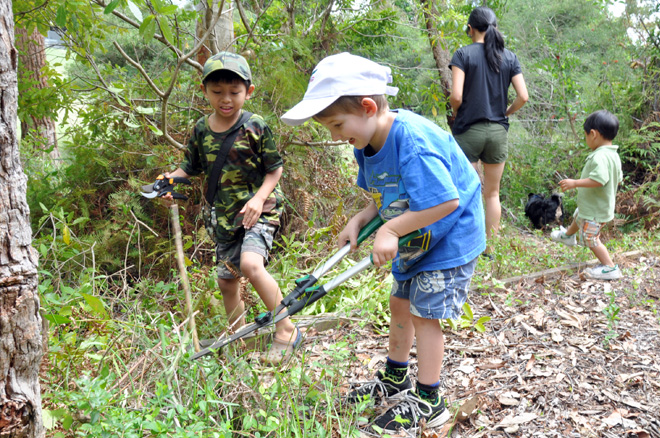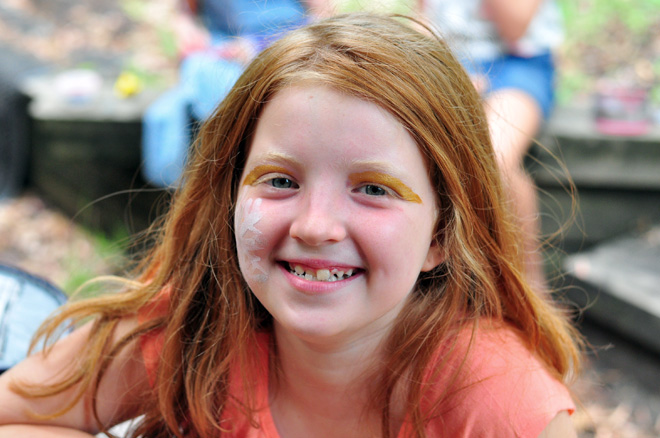Latest news
Focus and tinkering at Kinma
Lets walk into a tinkering pod last week. We’ll start in group 2 with Bea and a bunch of children making masks. They use bandages to construct personalised masks on each others’ faces. Each child chooses to do the activity after Bea provides information on what is involved. Two facets seem to be important in setting a stage for focus; some degree of interest and choosing to engage. They sit for an hour plastering each others’ faces; careful, small movements, applying wet bandages in a set fashion. Many stay willingly well after the pod is finished, and ask Bea to return for the start of the next session to complete their work.
Let us consider the idea of tinkering days. The children are presented with 7-8 pods in each of three 75 minute sessions. These balance experiences across physically moving/ still, artistic, scientific, indoor/ outdoor. There is nearly always cooking, gardening and sewing options, three core skills of life. The children choose from among the options. There are some choices, like cooking and mask making (Bea’s pod above), which need to be chosen the day before if the child wishes to participate, and a commitment needs to be made to stay for the entire 75 minutes in the one pod. Otherwise, children have the option to move freely among pods. Interestingly, children have been staying longer and longer at the one pod. We feel that this has happened after they have had the opportunity to roam freely among what is on offer.
I would liken this to children at out-times, generally, most of whom stay with one group for the duration. If you watch many of our children at these times, they are engaged fully in their ‘work’; building bases, dams, rock shops, plays, ideas, conversations, gardens. Often times, the work carries over into the next and the next and the following out-time. Focus then is almost the driver of the work at hand, freely chosen. Out-time as a construct, is essentially a choice time to engage with what and with whom a child likes. Together with Wednesday afternoon choice, Kinma children have close to 8 of their 30 hours at school to freely choose with what to engage, how and with whom.

Yet as Kay often explains to parents, there is a structure behind the ‘free’; there is a learning environment which has been carefully constructed within which children are safely choosing to take risks. Paradox? Safe to take risks? I think these two elements are at the heart of what Jonathan wrote last week- there is a sense of non-intervention but simultaneously there is a system which has form upholding it.
Step into a Maths lesson in group 3. There are 3 different groups working. Two independent, one with Suz, immersed on the floor, unpacking the division algorism. The bubbling conversation in one of the groups who are figuring multiple scenarios to an open ended maths puzzle is balanced by the utter silence in another who are increasing their speed on a set of facts. Suz’s group are not finding the work easy, some of the students are visibly uncomfortable. But that’s ok. Sometimes we need to move through ‘hard’ stuff and with support from a teacher with whom you have connection and trust, even a division algorism can be focused on … and indeed the fact that it is not a 22 minute lesson which is squeezed between a spelling stint of 19 minutes and a PE lesson for 26, means that the needed focus for working on something tough can be gradually built up. Focus takes time.
Lastly, step into a violin lesson. Look at Ivy’s face, Aidan’s or Mika’s. Some 80% of the children are fully immersed for their half hour lesson twice a week as they concentrate on holding their ‘precious’ instrument in the right manner and plucking or stringing the bow as Holly directs. Note, violin is not a choice. All of our children in their second year of school started a violin program at the start of this term. Once again Holly sets up a space with 6-7 year olds in mind; inviting, exciting. But this time there is very clear and solid expectations.
Focus doesn’t happen by mistake. Opportunities are built into your children’s days so that their absolutely natural in-built focus CAN come into play; in and out-time, choice and directed time. Build a structure which respects the children within and the focus can develop.
- Juli G, Educational Co-Ordinator

Term Dates 2025
- Term 1: Tues 4 February to Fri 11 April
- Term 2: Wed 30 April to Fri 27 June
- Term 3: Wed 23 July to Fri 26 Sep
- Term 4: Wed 15 Oct to Wed 17 Dec
Term Dates 2026
- Term 1: Mon 2 Feb – Thu 2 April
- Term 2: Wed 22 April – Fri 26 June
- Term 3: Wed 22 July – Fri 25 Sep
- Term 4: Wed 14 oct – Wed 16 Dec
Contact us
127 Coolowie Rd,
Terrey Hills NSW 2084
Find us on Google Maps
Primary: +61 2 9450 0738
Preschool: +61 2 9486 3018
Email Kinma

